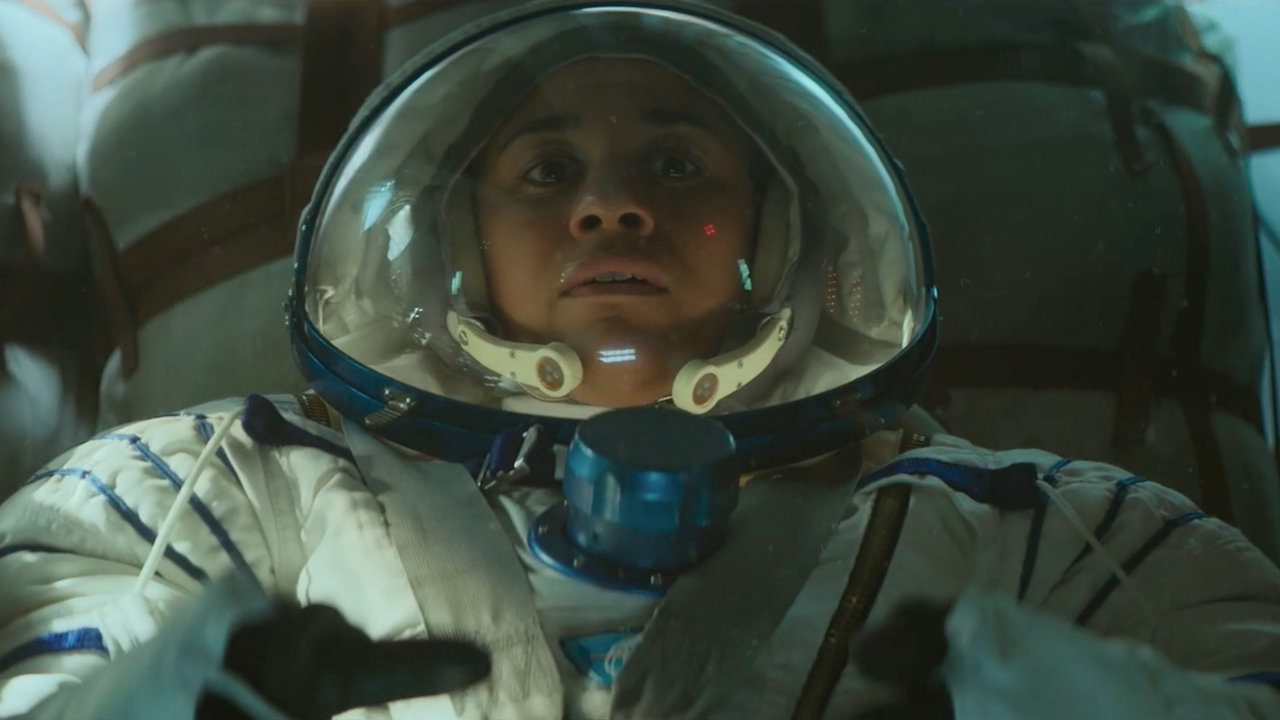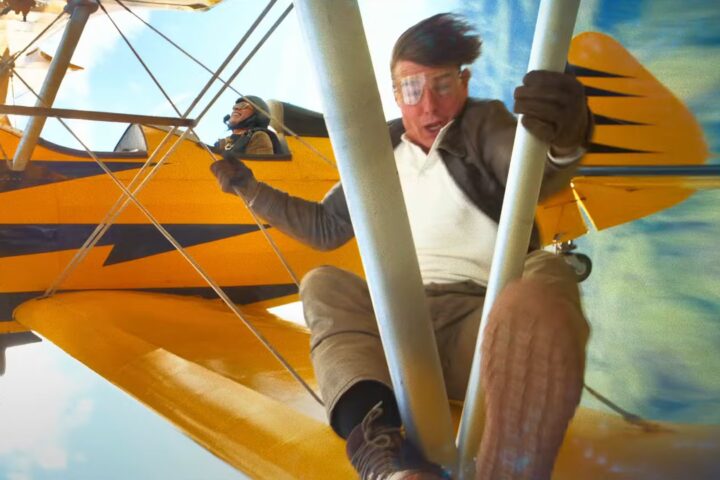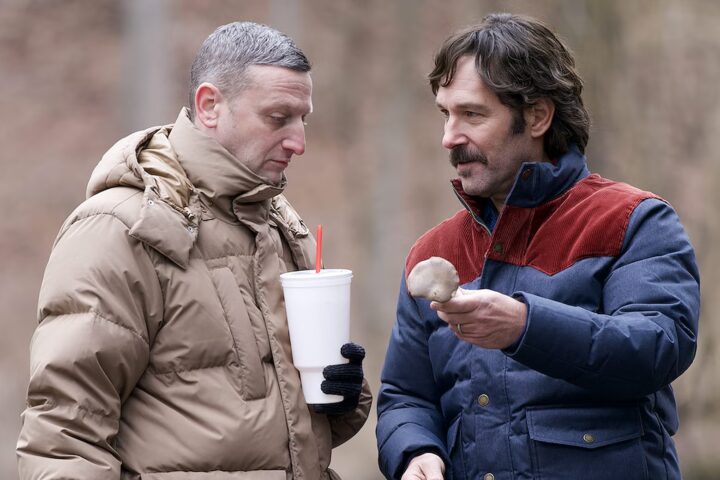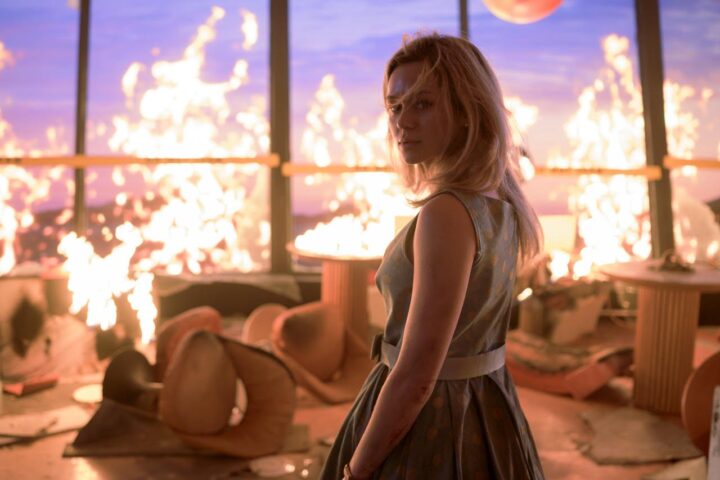The space-set thriller I.S.S. is a modestly effective U.S.-Russia face-off in which a handful of scientists are forced to confront national versus personal loyalties while a war between their respective countries wages on Earth. Set aboard the orbiting International Space Station laboratory 248 miles above the planet, BAFTA-winning filmmaker Gabriela Copperthwaite (Blackfish) directs a small cast in a confined setting to effective suspense, keeping us engaged for 90-plus minutes.
Working from a minimal screenplay by Nick Shafir, Copperthwaite crafts a low-key picture about very high stakes in her $13.5 million Bleecker Street backed outing, which looks expensive in both its elaborately designed space vistas and detailed orbital outpost sets. She has made the most of the money, to be sure. But has the script made the most of its premise?
Picture opens on the arrival of an American scientist to the I.S.S. lab, raising the tally of those onboard to six—three Americans and three Russians. New to the station is former marine and biologist Kira Foster, warmly played by West Side Story Oscar-winner Ariana DeBose, testing organ replacement advances on rats. Also onboard are fellow American astronauts Gordon Barrett (Chris Messina) and Christian Campbell (John Gallagher, Jr.), and their Russian counterparts Weronika “Nika” Vetrov (Masha Mashkova), having a not so clandestine affair with Gordon, and brothers Nicholai Pulov (Costa Ronin) and Alexey Pulov (Pilou Asbæk), a Russian biologist.
The picture indulges a few early bits of heavy foreshadowing—Kira is informed that “things don’t end well” for rats in captivity aboard the station while a dinnertime disagreement about the nostalgia of The Scorpions’ 1991 metal ballad hit Wind of Change resurrects unpleasant Cold War memories. Otherwise, the six simpatico astronauts live in camaraderie, gazing from the heavens at an Earth with a no borders, a harmony of shared scientific exploration which has yielded, we learn, a potential cure for radiation poisoning.
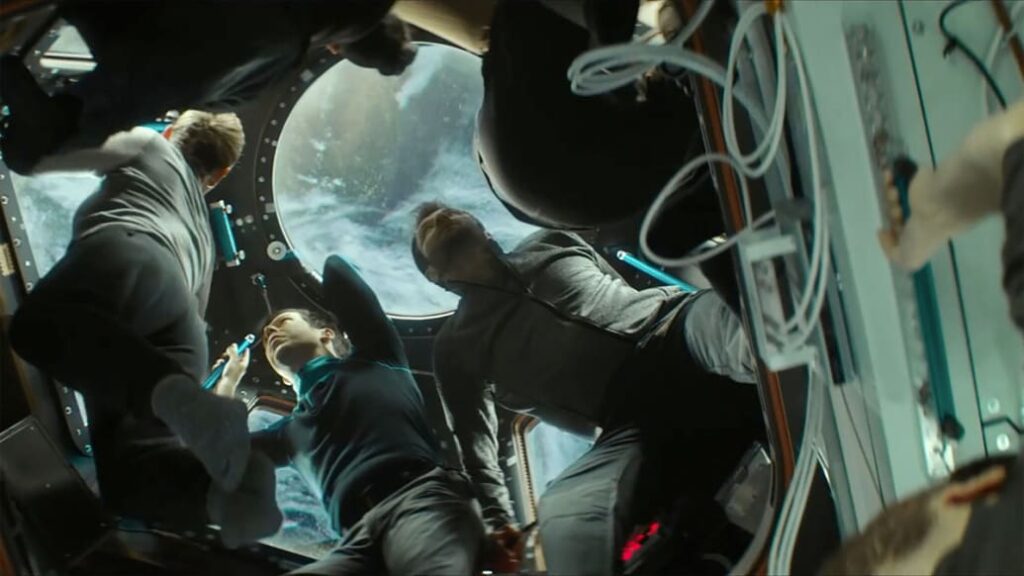
This equilibrium is shattered after Kira witnesses what she initially believes an erupting volcano on Earth below, quickly revealed to be an all out nuclear conflict between the U.S.A. and Russia. Immediately, the Americans receive a top secret NASA directive “to take control of the I.S.S. by any means necessary.” Have the Russians received the same directive from Moscow? Suspicions, whispers and tense silences ensue. Who is plotting what? Can personal and professional relationships be trusted? And importantly, would altruistic scientists with long held mutual commitments to research and each other actually devolve so rapidly into mere operatives of the state? Better not to question and just go with the fun.
Did I mention that the space station is sinking toward earth and certain destruction? What follows is a frequently tense wind-up of skepticism and betrayal yielding at least one good set piece, wherein Messina exits the space station to do “antenna repairs” amidst perilous conditions—the stock genre sequence of a lone astronaut in danger found in many a sci-fi thriller, and one that here serves to clarify the Russians’ take-no-prisoners agenda.
Back on board tensions boil over, the novelty here the physical tangles that take place with microgravity dynamics, which means when confrontations ensue—as they do during one impressive sequence between Nika and Nicholai—they not only float, spin and otherwise levitate toward combat, thrillingly disorientating via solid work from cinematographer Nick Remy Matthews, but they also spew (digital) bloodshed, suspended to fun visual effect. To achieve such moments of convincing weightlessness the cast donned restrictive tethers and wired harnesses, which reportedly took a year to digitally remove.
There isn’t much more going on in I.S.S., the screenplay’s thriller anxieties hung on a simple plot focused mainly on the team’s shifting loyalties and rising fears, though there is a brief ethical plea for jettisoning the team’s medical research back to Earth before the station goes up in atmospheric flames (the picture’s version of the last minute escape shuttle climax de rigueur in the sci-fi disaster film).
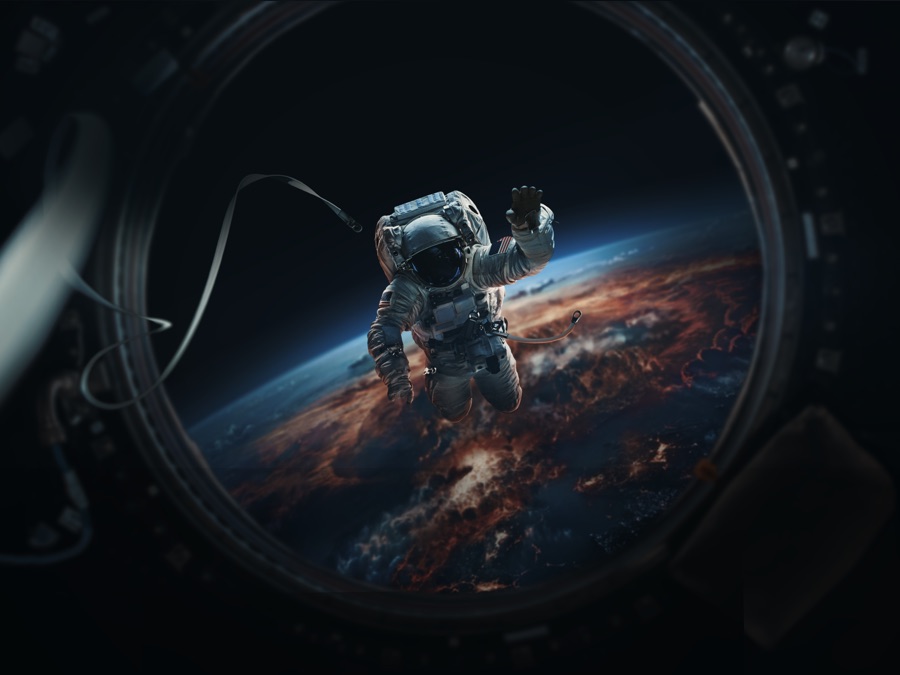
The second half of this somewhat under plotted picture finds the American and Russian teams vying for control of the station, every corner convincingly designed by the film’s production team, mounted as if to make James Cameron’s Alien proud. At one juncture two characters—biologists Kira and Alexey—forge a tenuous alliance while the aggressive Christian goes loose canon, courtesy of a nice turn by Gallagher, who makes the simple act of sandwich making a terror of perfectly calibrated menace.
DeBose, in her first non-musical screen role, is naturalistic and pleasingly relatable throughout, conveying believable humanity minus even a hint of melodrama despite navigating increasingly chaotic escalations. Matching her is Mashkova, delivering a terrifically performed mid-picture plea for female solidarity as disaster looms, and Asbæk, whose rising familial and moral quandary is pronounced across a number of the actor’s anguished silences.
I.S.S. strikes one as a Cold War curio and throwback B-movie (that’s a compliment), but one unlike, say, 1984’s Red Dawn, a flag-waving piece of jingoistic fervor. By contrast Copperthwaite’s picture eschews politics in its focus on trust and survival. Given the increasingly tense U.S.A. and Russia dynamics amidst the ongoing war in Ukraine, the film’s east-west tensions also feel serendipitously in the current moment, despite a screenplay written several years prior to the February 2022 inception of the current Russia-Ukraine conflict.
Copperthwaite has capably delivered a picture that aims slightly above the middle and achieves its modest goals with enjoyable suspense. While I.S.S. may feel familiar, its execution is slickly well-crafted. The picture’s lingering issues lie at the screenplay level, writer Shafir padding out the scant running time with thriller dynamics when it could have benefitted from greater character introspection, a richer scientific foundation or, like the best sci-fi, existential thematic contemplation. Such elements are largely sidelined, reducing what might have been a more substantive experience. Unlike its astronauts, the picture goes nowhere stratospheric.
3 stars
